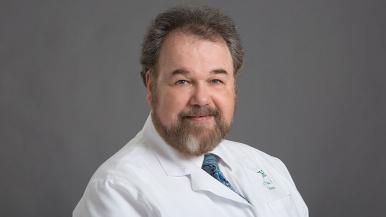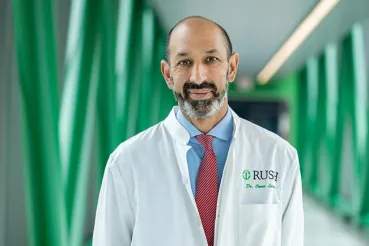Kirk Packo, MD, former chairperson of the Department of Ophthalmology, passed away on Sept. 1.
“All of us who knew Kirk loved and respected him as a brilliant doctor, amazing teacher and great leader," says Jonathan Rubenstein, MD, who succeeded Packo as chairperson when he retired in 2020 after 16 years in the role.
Packo came to RUSH in 1985 after completing his retinal fellowship at Emory University in Atlanta. He spent his entire career at RUSH. In speaking of Packo, Rubenstein remembers a man who was extremely dedicated and loyal to the medical center he'd called his professional home for nearly 40 years. "He loved to wave the RUSH flag," Rubenstein says.
Packo was known nationally and internationally in his subspecialty of vitreoretinal surgery. A prolific researcher and tireless innovator, he was credited with inventing over 25 surgical instruments. He was also known for his skill in handling the most difficult cases. "Complex retinal cases that nobody else would handle were referred to Dr. Packo, and he would take them on with expertise and with grace," Rubenstein says.
He was a past president of the American Society of Retina Specialists, which recognized his service to the organization in 2019 by presenting him with an award created and named in his honor, the inaugural Packo Service Award.
After his death, colleagues, former residents and students alike remarked on Dr. Packo's larger-than-life character. He was known all over the world for the quality of his teaching and the unmatched entertainment value of his lectures. "He was a showman," Rubenstein says. "He was a theater major at Notre Dame, and that was always an important part of who Dr. Packo was."
Thomas Deutsch, MD, who served as chairperson of the Department of Ophthalmology just before Packo's tenure, said this the day he learned his friend of more than four decades had died:
"We met the very first day that we could be called 'ophthalmologists,' although that was obviously a title, not a fact," he recalled. "We were tempered in the same kiln and had almost mirror experiences over 43 years. Watching his fierce battle with a disease reminded me of the way he battled some of the worst retinal problems of his patients. He never gave up."




